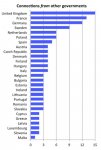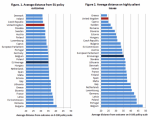Laughing
Well-known member
If you say so LittleJimmyI think it's more a case of not admitting it rather than not accepting it. Nobody likes admitting they were duped.
I'm also looking at Scotland or further afield.
If you say so LittleJimmyI think it's more a case of not admitting it rather than not accepting it. Nobody likes admitting they were duped.
I'm also looking at Scotland or further afield.
All of that would be better addressed from within the EU and the Euro-Zone is irrelevant as we were never going to be in it.We have done this on the old site Adi, and you didn't agree with me, but briefly again:
Common security and defence policy - whilst as it stands it doesn't concern me that much, but it has changed over time and will continue to change, I don't want another super power on the planet.
European Commission - my MEP cannot propose legislation, they can, of course veto legislation, but cannot propose it, that is shocking state of affairs for a democracy.
European Commission - I don't like the way it is elected and with respect to the point above we do not know how the commission will be formed before casting votes in a European election.
I don't agree with the fiscal power the EU has over the Euro-Zone and the punitive actions it can take when a member state falls outside of the regulations for membership of the Euro-Zone
There are, of course other things I don't agree with, but if we were out of the EU political process we wouldn't have to concern ourselves with some of the machinations of the European Commission.
It was clear Johnson was being lined up many years ago, it was also clear that it was simply a cult of personality rather than any actual ability. The press have made politics largely about personality rather than policy and the last election was the absolute epitome of that. Where a bumbling idiot won, in spite of his policies being largely not clear, Corbyn, like or loath him had clear policies on most things that were actually well supported, but he was like watching drying paint. The one exception was brexit....which, could be argued was a cult of personality in itself, either a UK personality as a world power, or individual as in the loud and boisterous Farage, JRM and others, it certainly wasn't a well thought out coherent strategy for a better UK.It's an argument I have used since day 1 - no revisions happening here BoroMart. And no I wasn't hoodwinked, 4 years ago it never crossed my mind that we would have Johnson as PM, I just couldn't envisage an electorate stupid enough to let that happen - how wrong can you be.
Immigration was never an issue for me, the politicization of the EU was why I wanted out. I had no issue with staying in the market or indeed freedom of movement.
The truth is both from May and now Johnson both have failed miserably with negotiations. I am not even sure what Johnson wants, does he want a deal or not, it is difficult to tell. If we leave with no deal it will be political suicide for him and his cabinet.
I also didn't expect to be in the economical position we now find ourselves in, and the transition period should have been extended, not that I think that would make any difference, Johnson is inept.
^^^^^ This.I This is far far more corrupt and unaccounted than the EU parliament.
We have done this on the old site Adi, and you didn't agree with me, but briefly again:
Common security and defence policy - whilst as it stands it doesn't concern me that much, but it has changed over time and will continue to change, I don't want another super power on the planet.
European Commission - my MEP cannot propose legislation, they can, of course veto legislation, but cannot propose it, that is shocking state of affairs for a democracy.
European Commission - I don't like the way it is elected and with respect to the point above we do not know how the commission will be formed before casting votes in a European election.
I don't agree with the fiscal power the EU has over the Euro-Zone and the punitive actions it can take when a member state falls outside of the regulations for membership of the Euro-Zone
There are, of course other things I don't agree with, but if we were out of the EU political process we wouldn't have to concern ourselves with some of the machinations of the European Commission.
Greece did it to themselves by having had decades of uber corrupt national politicans......that's where we are now headed. The handing out of contracts to mates and subverting of process, and persistent lying and dishonesty to cover real policy is exactly what made Greece bankrupt. It was not the EUs doing, and it was not their role to bail them out, but they did.ST I answered your main question about Cummings in my response to BoroMart. I think MEP's can veto legislation, though not on their own, obviously.
The EZ - Yeah I do care and whilst it is not politically relevant to the UK, I don't like what we (the eu) did to Greece
It's fine to car about the euro zone. It's not really a reason for supporting Brexit though is it? With it not being relevant to our membership of the EU.ST I answered your main question about Cummings in my response to BoroMart. I think MEP's can veto legislation, though not on their own, obviously.
The EZ - Yeah I do care and whilst it is not politically relevant to the UK, I don't like what we (the eu) did to Greece
First, why am I bothering?It's fine to car about the euro zone. It's not really a reason for supporting Brexit though is it? With it not being relevant to our membership of the EU.
First, why am I bothering?
Common security and defence policy - whilst as it stands it doesn't concern me that much, but it has changed over time and will continue to change, I don't want another super power on the planet.
European Commission - my MEP cannot propose legislation, they can, of course veto legislation, but cannot propose it, that is shocking state of affairs for a democracy.
European Commission - I don't like the way it is elected and with respect to the point above we do not know how the commission will be formed before casting votes in a European election.
I don't agree with the fiscal power the EU has over the Euro-Zone and the punitive actions it can take when a member state falls outside of the regulations for membership of the Euro-Zone
Nice to talk to you again Adi - OK Yes that is correct as it stands today with respect to NATO. The requirement for a unanimous vote doesn't impress me very much in terms of the UK vetoing such action, the smaller nations will be bullied and cajoled into agreement so really the decision is based on the top 4 or 5 member states. Secondly, the point about NATO would become invalid if we became a single state, and the UK have demonstrated in the past they are prepared to ignore UN resolutions and by extension NATO limitations.But you accept, presumably, that:
1. Any expansion of the CDSP would need to be ‘compatible’ with NATO policy;
2. Any such expansion of the CDSP would require a unanimous decision of the European Council (giving the UK a right of veto) and even if there was such unanimity such decision would then need to be ratified by a referendum, as set out in section 6(2) of the European Union Act 2011?
In which case the risks are really pretty low of any significant steps in that direction.
Again, you presumably accept that:
1. There are over 750 MEPs and giving each of them individually the power to propose legislation would be unworkable and unwieldy and slow the machine down to a crawl.
2. The power to amend the EU's constitution is reserved to the member states i.e. the government we elect;
3. As you acknowledge we have significant and extensive veto rights and a lot of influence to shape the legislation proposed;
4. It is not dissimilar in our own Parliament in which MP's can introduce Bills but ultimately getting laws on the statute book is really a matter of scrutiny, majority and committee.
So again I am not sure this really stands up to scrutiny as a major problem. The mechanics of legislating within the EU framework might not allow for individual MEPs to propose legislation (not that we seem to care enough to vote in any number for MEPs anyway even if it did) but they certainly afford us significant influence, certainly more than almost any other EU member state. We are in a uniquely privileged position in that respect.
Nice to talk to you again Adi - OK Yes that is correct as it stands today with respect to NATO. The requirement for a unanimous vote doesn't impress me very much in terms of the UK vetoing such action, the smaller nations will be bullied and cajoled into agreement so really the decision is based on the top 4 or 5 member states. Secondly, the point about NATO would become invalid if we became a single state, and the UK have demonstrated in the past they are prepared to ignore UN resolutions and by extension NATO limitations.
Why can't they propose legislation, anyone in parliament can put forward legislation and there are 650 of them.
Yes we do have a bigger influence than most other member states, did't stop Cameron coming back from the european parliament with his tail between his legs on numerous occasions.
As I said Adi, we have had all these arguments before, you don't agree with me, which is fine, I do wonder though, had we not had a referendum and these arguments had been hypothetical whether people would have disagreed with me so strongly. I don't know.
Anyway good to have you back, we argued all the time, but it was always a good clean fight.


